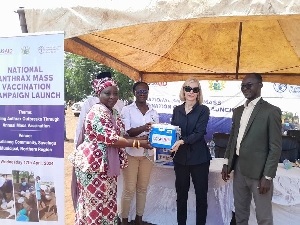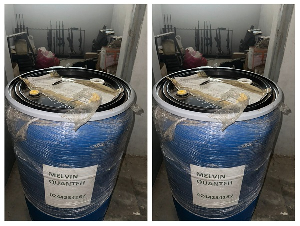 USAID-Ghana Mission Director handing over samples of anthrax vaccines to Ghanaian health officials
USAID-Ghana Mission Director handing over samples of anthrax vaccines to Ghanaian health officials
The United States of America (USA) has handed over 100,000 doses of Anthrax Vaccines to Ghana to aid in the government’s planned Anthrax Vaccination campaign.
The donation which was made by the U.S government through the United States Agency for International Development (USAID) is expected to cover about one million animals across the five regions of Northern Ghana.
Last year, Ghana experienced an outbreak of anthrax, an infectious disease common to animals that can also be passed to humans if they come in contact with infected animals or contaminated animal products.
At least one human life was lost while a total of 97 animals died from the outbreak, affecting six districts in the Upper East Region.
13 other people contracted the disease.
To prevent a future outbreak, government plans to embark on a vaccination exercise later this year.
To support the government’s efforts, the US government purchased 100,000 doses of the vaccine from the Central Veterinary Laboratory at Pong-Tamale in the Savelugu Municipality of the Northern Region.
Speaking at the launch of the annual anthrax vaccination campaign at Kpalung in the Savelugu Municipality on Wednesday, Kimberly Rosen, the USAID-Ghana Mission Director, said anthrax does not only threaten human lives but also economic prosperity and food security.
“Anthrax not only threatens human life. When it infects livestock, it also threatens economic prosperity and food security” she said.
Stressing the importance of regular vaccination campaigns, she stated that vaccinations would prevent “unfortunate and avoidable deaths and infections.”
Ms Kimberly praised Ghana for putting up the Central Veterinary Laboratory, saying that with some automation and more investment, the lab could produce larger quantities of vaccines to meet national demand and also be exported.












